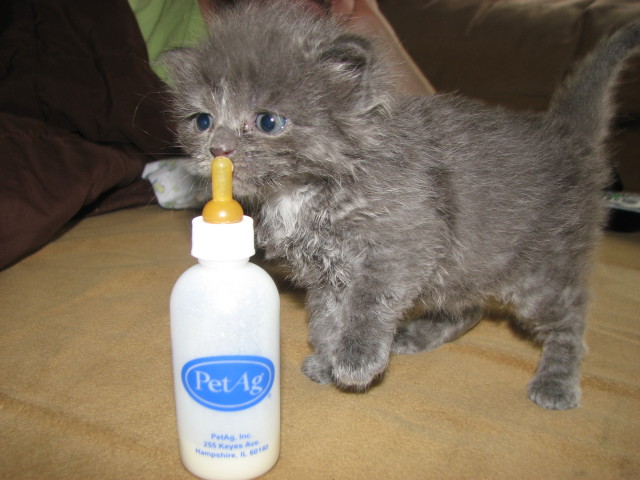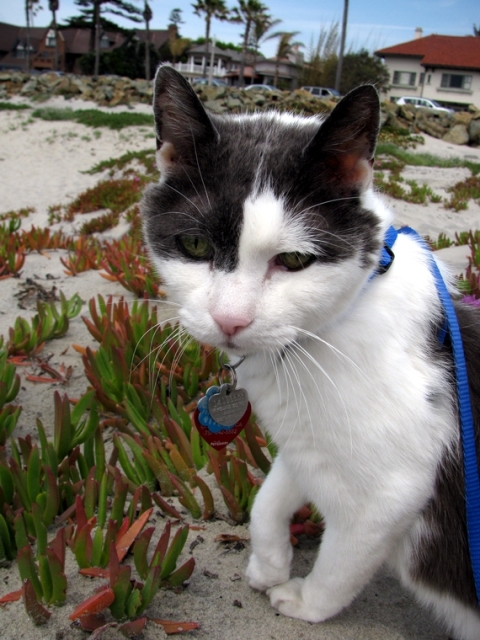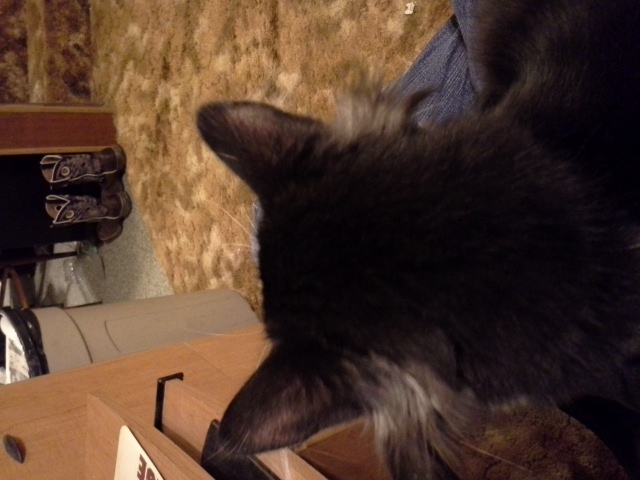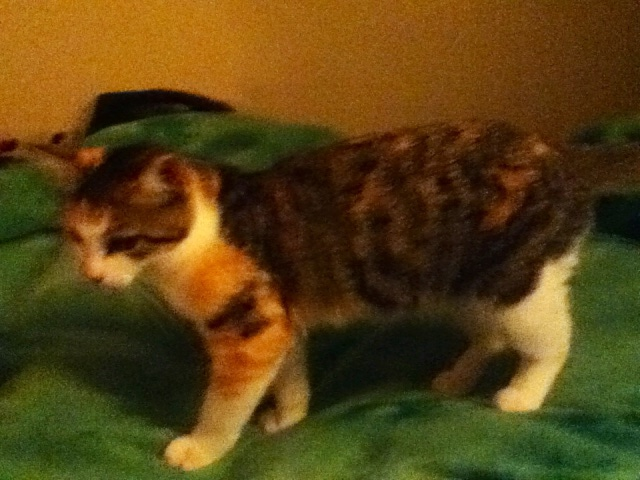QuestionHi. I have a Maine coone mix along with 4 other cats, how recently she has gotten so skinny that you can feel each spinous process on her back. She is still eating and eating and playful, but as an ER nurse, looking at her compared to the others keeps worrying Me.
Thanks
Tracy
AnswerTracy,
In a multiple cat household it can be difficult to watch each cat closely since they often go about their business in entirely different directions each day. Although I'm not a veterinarian and therfore I can't offer medical opinions, diagnoses or treatment recommendations there are a few things that leave me quite concerned based on the fact that you know that your kitty is eating well and she's losing a significant amount of weight. This little girl could have any one of several serious health problems that require immediate treatment by a qualified veterinarian. A conventional or holistic veterinarian will most likely perform a number of diagnostic tests to determine what's going on with this little girl that's causing her to lose weight. I would expect your vet to perform a complete pre-anesthetic blood profile, CBC, blood chemistry profile and a urine analysis for starters based on the history of your baby girl's weight loss despite eating well.
I would strongly suggest that you consider seeking the advice of a holistic veterinarian in your local area before making any major decisions about your cats future if it turns out that she's diagnosed with a serious illness. Holistic vets are licensed veterinarians trained in conventional medicine. In the majority of cases these doctors made the decision to further their education and learn about alternatives to conventional treatments. Some alternative treatments that holistic vets may choose to incorporate into their veterinary practice include homeopathy, acupuncture, massage, herbal medicine, etc. I'm sure that some veterinarians decide to further their education to include one or more alternative therapies in their practice because they've become frustrated with the inability to provide pet parents with effective treatments for physical and psychological issues using conventional medicine alone.
Our family vet is absolutely fantastic for a number of reasons, she's kind and gentle with her patients and she's absolutely brilliant when it comes to the way she practices veterinary medicine. Our veterinarian has spent years running a busy, rapidly growing full time vet clinic, somehow she's managed to further her education by taking courses to learn about the basic principles of homeopathy as well as the practical uses of homeopathy in veterinary medicine. Our vet uses homeopathy to treat her four legged patients, sometimes homeopathic remedies are used in combination with conventional medicine, in other cases when it's appropriate and safe to do so the vet will treat pets with homeopathic remedies instead of using conventional medicine. Homeopathy has several advantages over conventional drugs prescribed for specific physical, psychological or behavioral issues - progress can be shocking in terms of the speed improvements happen at and I've learned that if the right remedy is administered at the right time amazing things can happen. With conventional drugs the wrong drug being administered to the wrong patient at the wrong time the effects can be devastating or even fatal, if the wrong homeopathic medicine is administered the worst thing that will happen is absolutely nothing.
It's quite possible that your kitty has developed diabetes. The symptoms of early feline diabetes are excessive urination, excessive thirst, increased appetite and weight loss, as the blood glucose levels become higher cats can become lethargic and develop progressive weakness in the hind legs as a result of diabetic neuropathy. If feline diabetes remains untreated then your cat can develop more serious symptoms related to high blood glucose levels. Some symptoms of advanced untreated feline diabetes include vomiting, loss of appetite, dehydration and their coat may be in poor shape. Two potentially fatal symptoms of advanced untreated feline diabetes include liver disease and secondary bacterial infections. In a multiple cat household it can be difficult to determine exactly how much any one cat is eating, drinking or using the litter box unless you have the time to sit and monitor the food/water consumption and litter box use of each cat on a daily basis (and nobody that I know has time for that). You are an expert on your own cat, what I mean by that is that you know her better than anyone, you know what's normal for her and what's not.
You can fairly easily check the condition of your little one's coat just by petting or grooming her to see if her coat feels greasy, overly dry or she has dandruff. A cat's coat being in poor condition can be related to illness, lack of grooming or poor (species inappropriate) diet so this is a fairly non-specific symptom. It's fairly simple to assess a cat's level of hydration at home. All you need to do is gently pull the loose skin at the scruff of your cat's neck up slightly and let it go, you should see the skin bounce back into a normal position quite quickly, if a roll of skin remains or the cat's skin doesn't go back into position this is an indication that your cat is dehydrated which requires immediate medical treatment (IV fluids) and testing to determine the cause of your cat's dehydration. Even if your kitty passes the skin pinch test it's possible that she may still be dehydrated (my middle cat proved that recently when he was sick and required hospitalization and when he came home he needed round the clock care).
Another potential cause for your girl's weight loss is hyperthyroidism. Some of the more common symptoms of hyperthyroidism in cats are weight loss, appetite changes (increased or decreased appetite can indicate illness), nervousness, muscle weakness, vomiting, diarrhea, excessive thirst, excessive urination, poor hair coat, high heart rate and labored breathing. Hyperthyroidism is becoming increasingly common in cats. This condition is often caused by a benign tumor on the cat's thyroid gland that increases the level of hormones secreted by the cat's thyroid gland which results in their metabolism speeding up considerably, that in turn can cause issues with other major organ systems in that cat's body. During a physical exam your vet may detect a rapid heart rate or your kitty may have an obvious heart murmur. Most cats who are diagnosed with hyperthyroidism are middle aged to elderly which is why veterinarians suggest that cats who are 8 years of age or older be tested regularly during their routine physical exams performed throughout the year.
Cats who have hyperthyroidism commonly have other serious medical problems that require treatment including kidney disease, heart disease, dental disease, diabetes and high blood pressure which can cause damage to the cat's retinas and lead to blindness. Your vet will need to run specific blood tests to look at your cat's hormone levels associated with her thyroid and s/he may pay special attention to blood tests related to liver function. It is possible for a cat to have normal thyroid levels and still have hyperthyroidism, so a normal blood test doesn't necessarily rule this possible diagnosis out. Low hormone levels associated with the thyroid gland in a cat with hyperthyroidism can indicate that your cat is in the early stages of hyperthyroidism, but it's also important to note that thyroid levels fluctuate normally throughout the course of a day.
According to information on various veterinary websites dealing with feline hyperthyroidism there are three treatments available for this condition. Radioactive iodine is often used to selectively destroy the part of the thyroid gland that is abnormal. The main advantages of this treatment option include a high success rate and this treatment doesn't require anesthesia. A drawback to choosing this treatment option is the fact that the cat must be boarded at the facility that administers the treatment for roughly 10 days to minimize radiation exposure to other people and pets within the household. Administering radioactive iodine is done in a special facility and this treatment option is usually only available if your vet refers you to the specialist. Before the specialist administers radioactive iodine s/he will confirm the diagnosis of hyperthyroidism by performing a scan. It's important that your cat have her kidney function tested before receiving this treatment to ensure that she's healthy enough to cope with the radioactive iodine. If kidney disease is present your cat may not be a suitable candidate to receive radioactive iodine. In some cases hyperthyroidism induces high blood pressure which can actually protect kidney function because the increased blood pressure means that there is increased blood flow to the cat's kidneys which helps them to function more efficently to remove toxins from your cat's body.
If your cat is older and the vet suspects that the increased blood pressure caused by hyperthyroidism is protecting kidneys that aren't functioning well s/he may recommend against providing any treatment which may reduce the risks that your kitty will suffer from renal failure. If blood tests reveal that your cat's kidney function is compromised the veterinarian will likely try to balance the cat's dosage of Tapazole to help the cat feel better by decreasing excessive levels of thyroid hormones in the cat's system while still allowing the thyroid levels to remain high enough that the cat has high blood pressure and will still benefit from the increased circulation to her kidneys. A second treatment option that your vet may consider is a drug called Tapazole. This medication is fairly inexpensive and easy to administer. There are some drawbacks to using Tapazole - since the drug doesn't cure the hyperthyroidism the cat must continue the treatment on a long term basis. Some cats have side effects associated with this medication, these may include vomiting, diarrea and depression. These adverse effects can be managed by adjusting the dosage of medication the cat receives. Cats who are receiving this treatment will be closely monitored over the course of several weeks to ensure that they're receiving the correct dose, then thyroid levels will be re-checked around 3-6 months after they started the medication.
A third common treatment option for hyperthyroidism is surgery which is very effective, but not without risk. Any time that a cat receives anesthesia there is always a certain amount of risk associated with the anesthetic itself. Surgery to treat hyperthyroidism is usually successful and the cat's condition generally shows rapid improvement. As with any surgical procedure the possibility of complications is there, some of the potential complications associated with this surgery include hypothyroidism, paralysis of the cat's throat muscles and improper calcium metabolism. From what I understand these complications are rare, but it's important to be aware of them. Tapazole may be prescribed before the surgery in an effort to minimize the symptoms of hyperthyroidism in an effort to minimize a cat's risks associated with undergoing surgery.
Cats can often hide illnesses or injuries until they're unable to do so any longer. Based on the information that you gave me there is a possibility that your kitty is seriously ill. If she was my cat I'd take her to a vet immediately (or ASAP,with a sense of urgency) so that the cause of her weight loss can be found quickly and fixed if at all possible. I would expect the vet to perform blood work, a physical exam and other diagnostic tests. There are a number of different possibilities that would explain what's happening with this kitty and although I wish that I could offer you more concrete information I really cant't, it's beyond my expertise. Ultimately any decisions that you make about your cat's medical care come down to what's happening, whether she's in pain and what her lprognosis is. I do recommend that you seriously consider the idea of having your kitty assessed by a holistic vet before making any major decisions about your cat's future if she's seriously ill because it's possible that alternative treatments may offer answers that conventional medicine isn't able to at the moment. For an example of what I'm talking about I've included my eldest cat's story pertaining to how homeopathic remedies saved her life. I really wish that I could offer more to help, but this kitty really needs medical attention to determine what's going on so that you can decide which choices you want to make about her care.
I've used Bach Flower Essences on cats in my care for many years now and I've seen some incredible things happen in terms of personality and behavioral changes in cats of all ages. There are some major advantages to consider when deciding to whether or not you want to try using homeopathic remedies to treat your cats including the fact that homeopathic medicine is safe, the worst thing that will happen if you administer the wrong remedy is absolutely nothing. My vet explained some of the benefits of using homeopathic remedies because I wanted to know more about thean experienced, properly trained holistic practitioner illness (behavioral issues, injuries, negative state of mind)have over many conventional allopathic medicines is the fact that they are gentle, safe, effective and less expensive than many traditional drugs.
Initially to be honest I have to admit that I was skeptical about other homeopathic remedies being effective, however I kept an open mind and I was prepared to give them a try if a suitable situation ever came up. In November of 2007 my oldest cat MC (short for Miracle Cat) developed severe acute renal failure as a result of eating tainted cat food during the Menu Foods recall. My husband and I took MC to the emergency veterinarian at 2 am one morning when it became exceedingly clear that she was really sick. MC had been vomiting occasionally for 2 days so I was paying more attention to her, but I really didn't think much of it at the time. Our rather expensive outing to the 24 hour vet clinic left us stunned, MC's kidney values were sky high and at that time we weren't aware that our food had been recalled, that information wasn't available until much later. The on call veterinarian at the emergency clinic recommended euthanasia stating rather bluntly that the chances of MC recovering were slim to none, she told us that it would be in my baby girl's best interests to humanely euthanize her to relieve her suffering. I wasn't prepared to make that decision without at least consulting our family vet. As soon as our vet's answering service would put her through to us we called her and told her about the night's events, she told us that she'd meet us at the clinic early that morning. My husband and I were still stunned and distressed at the very thought that MC had been 100% healthy at her annual physical the previous month and now we were having to consider euthanasia.
Our vet immediately started MC on IV fluids and recommended that we not make any final decisions until we saw whether rehydrating her would improve her BUN/Creatinine levels. The following day we were devastated to hear that MC's kidney function was continuing to deteriorate, our vet recommended waiting for 48 hours before checking her values again. The following day I visited my baby girl at the hospital, I held her, talked to her, took pictures of her and when feeding time came around I fed her. I was terrified that our visit would be the last time we'd spend time together, so it was with a heavy heart that I went back home that day. The following afternoon my vet's business partner called with the latest blood results, miraculously MC's BUN/Creatinine levels had dropped into the normal range and she could come home the following morning. We were so relieved that we left the house early the following morning for the hospital, when we arrived the vet still wasn't there but the technician let us in, took MC's IV catheter out, took her vital signs one last time and allowed us to visit with our baby girl in the empty exam room. MC looked amazing, she was full of spunk, in fact our little girl swatted the thermometer out of the tech's hand as she tried to take her temperature. Conventional veterinary medicine means that cats with kidney disease received two basic treatments in 2007, cats were prescribed a low protein canned food and their caregivers are taught to administer subcutaneous fluids at home whenever necessary.
Immediately upon arriving home much to our dismay MC decided that she would not eat the expensive prescription food, I guess that just like most people my little girl apparently wasn't fond of hospital food. MC wanted her regular food back, worried we consulted our vet and were told that it was more important to ensure that MC was eating and drinking well than it was to restrict her protein levels and keep her on a prescription diet, so she won the battle and got her food back. MC's initial prognosis was good, but we were told that she'd require supplementary fluids for the remainder of her life, at least that's what conventional wisdom suggested in the veterinary field and our baby girl's initial follow up blood work done a month or so after her discharge from the hospital appeared to support that theory. As I'm sure you can imagine I wasn't a fan of poking my kitty with needles so I did my best to put off her fluids until she clearly needed them and MC's kidney values were slightly elevated, our vet recommended that we start giving the fluids daily so we did. From that point forward MC's BUN/Creatinine levels improved considerably over time until her kidney function was completely normal which happened around our 2nd follow up appointment for blood work and it remained that way for the rest of 2008. When we saw our vet for the cats' annual physical exams MC's blood was tested again and was still completely normal. Our vet recommended that we try weaning MC off of her fluids, I have to admit that I was pretty scared that something would go wrong and MC wouldn't be able to beat the odds a second time so I started decreasing the amount of fluids she received gradually until we were able to stop the fluids entirely. I watched MC closely for any sign of illness, I didn't want to miss the subtle cues a second time and to my relief nothing bad appeared to be happening, but I really didn't relax until MC's blood work was done in May 2009. MC surprised me completely, her kidney values were completely normal and we were ecstatic.
Weaning MC off of her fluids is a very significant acheivement because most cats with kidney disease being treated by a veterinarian who practices conventional medicine only are prescribed a low protein diet and sub-q fluids to be given as required for the remainder of their lives. What makes this story even more incredible is that when MC was hospitalized our family vet administered a few homeopathic remedies specifically to help improve her renal function and get her back on track medically. MC did receive conventional treatment in addition to the homeopathic remedies she was given, but thousands of cats and dogs with renal failure as severe as MC's was lost their lives after eating melamine tainted food manufactured by Menu Foods, the only difference in her treatment comes down to the fact that she was given appropriate homeopathic remedies to compliment her conventional treatment. Apart from the remedies MC received while she was in the hospital I have no other concrete way to explain why MC had such a dramatic and amazing recovery, so many cats and dogs who received the conventional treatments that MC did ended up losing their lives after eating tainted food during the 2007 pet food recalls. MC wasn't in good shape, in fact based on her BUN/Creatinine levels and overall condition we were told by two different veterinarians from two separate vet clinics including the 24 hour emergency clinic that our little miracle's condition carried a very poor prognosis with a slim chance of survival. MC's managed to beat all the odds for the third time in her life, since the middle of May 2009 she hasn't received any treatment at all for her kidneys, and the miracle in this whole situation is that she's 100% healthy, her kidney function is completely normal.
At the moment I'll keep you and your kitty in my thoughts and prayers. I really hope that your vet diagnoses something that's easily treatable. If you have any questions, concerns or you'd like me to clarify anything in this answer I'd be more than happy to help out to the best of my ability, even if it's just to offer an empathetic ear - I know just how difficult and heartbreaking it can be to know that a cat is sick so please feel free to contact me with an update as I'd be glad to find out how your little girl is doing. Do take care of your kitty and yourself.

 Kitty Peeing
Question
Howie
Our kitten is about 8 months old
Kitty Peeing
Question
Howie
Our kitten is about 8 months old
 bottle feeding orphan kitten.
QuestionQUESTION: I rescued my kitten when he was 2 wee
bottle feeding orphan kitten.
QuestionQUESTION: I rescued my kitten when he was 2 wee
 18 year old cat has blood clots in urine
Question
Tucker
My 18 year old male neutered cat is hyp
18 year old cat has blood clots in urine
Question
Tucker
My 18 year old male neutered cat is hyp
 Can you give me an idea for possible cat breed?
Question
Tufts Maverick
My cat Maverick ha
Can you give me an idea for possible cat breed?
Question
Tufts Maverick
My cat Maverick ha
 Short Tailed Manx Kitten
Question
Una Mica Una Mica
Hello,
I go
Short Tailed Manx Kitten
Question
Una Mica Una Mica
Hello,
I go